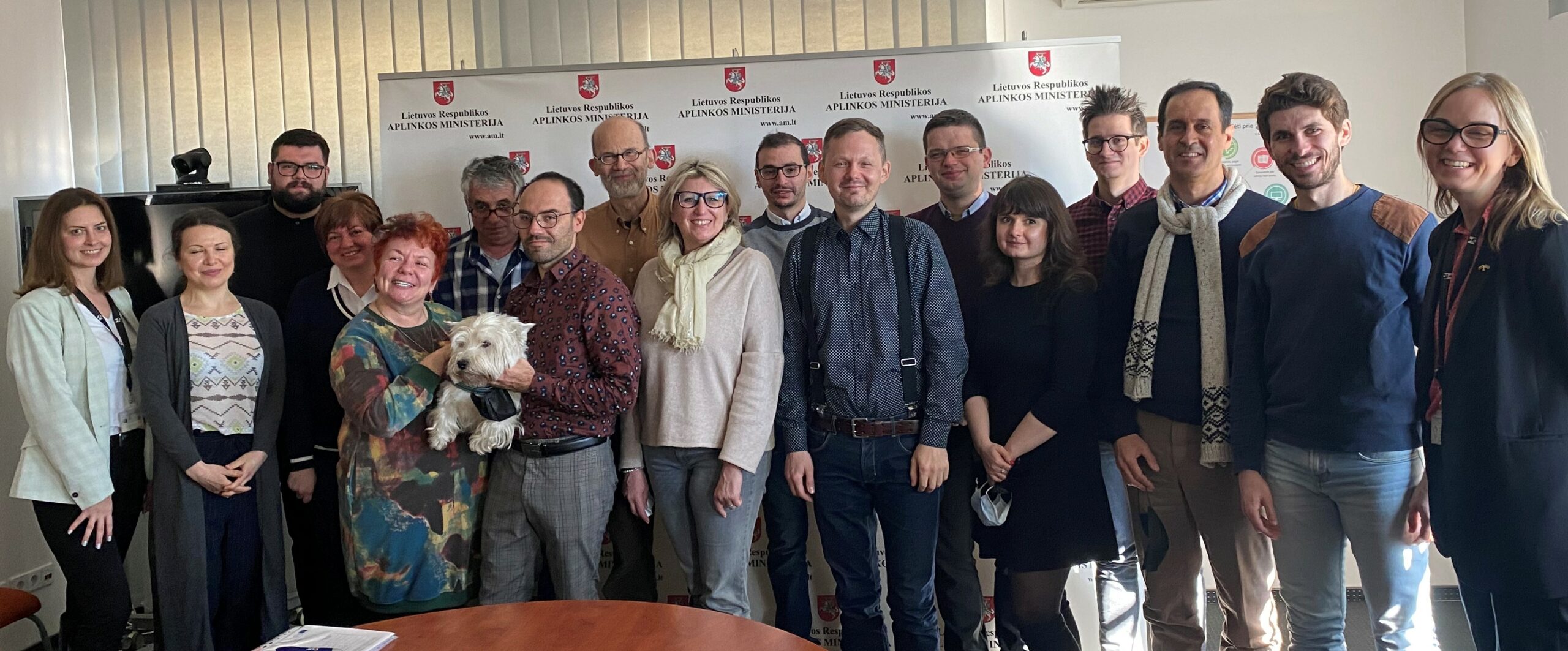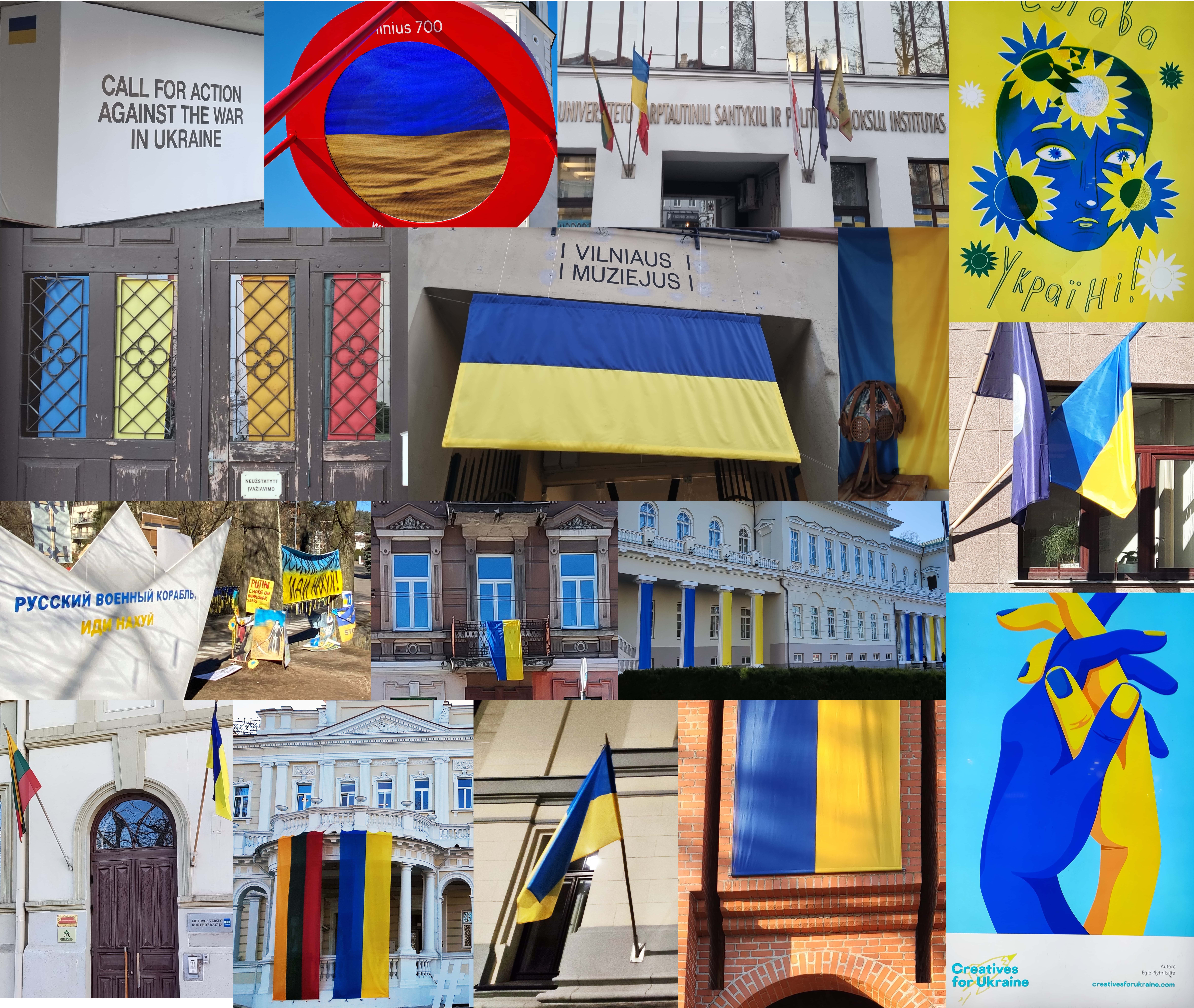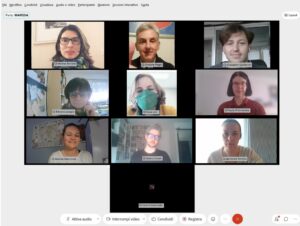
The fifth and last of the international mobility LTTA – Learning, Teaching and Training Activities – envisaged by the Erasmus Plus “Click on T” project took place in Lithuania from Tuesday 15 to Friday 18 March 2022.
After the experience in Romania, which took place in January, the representatives of Fondazione Toscana Sostenibile Italy, Carla Sabatini and Sergio Brunetti left to face four days of training activities of various types including visits, workshops and seminars together with the partners.
Hosting and organizing this last session was the organization Socialiniu investiciju valdymo centras (Socinvest) which deals with non-formal adult education and consultancy.
The participants carried out a series of activities centred on the theme of the importance of communication; partners shared their experiences of raising adult awareness of climate change and together analyzed concrete ways in which they address these changes.
The appointments started at the Visitor Center of the State Service for Protected Areas of the Ministry of Environment in Vilnius, on the afternoon of March 15, with the arrival of the partners, the official welcome, and the presentation of the program. This was followed by a seminar on the experience gained during the dissemination activities relating to climate change held by the partners. All the representatives of the project partners presented the state of the work regarding the project, followed by a series of questions from all the participants to the various exponents of the national works.
Finally it was the turn of Gabija Gataveckaitė, member of the NGOs Fridays for future Lithuania and Extinction rebellion Lietuva,, who brought the experiences and methods of activity of the two groups to which she belongs and a presentation entitled Ways of communication of climate activists. The presentation was captured for future reference. The meeting ended with questions from the participants. The day ended with a dinner for the whole group in a vegan restaurant.
On the morning of March 16, activities resumed again in the Visitor Center.
It was introduced by Lina Paškevičiūtė Environmental Coalition, an umbrella organization that brings together various Lithuanian NGOs related to the environment, whose mission is exactly the focus of ClickonT: to exchange knowledge, experience, resources and education of citizens on the issues of the environment through an open, systematic and constructive dialogue.
The processes of NGO organizations relating to the environment were presented in detail, starting with the National Forest Agreement (NMS) and then moving on to the topics of courses and training. His speech was much appreciated and many questions were followed by the participants from the various countries involved in the project. Also, in this case, the documentation produced by the speaker was integrated into that of the ClickonT project.
 After a very short coffee break, interviews were carried out with the participants in the project, mainly focused on their roles and the activities of volunteers at home, and how the education of the over 30s on their part is dealt with.
After a very short coffee break, interviews were carried out with the participants in the project, mainly focused on their roles and the activities of volunteers at home, and how the education of the over 30s on their part is dealt with.
Following, a Workshop “How to transform messages into a story” by a representative of the Visitor Center of the State Service for Protected Areas of the Ministry of the Environment at the exhibition area of the Ministry premises. In this case, various dissemination and educational media are integrated along a circular path that begins with an important foundation for the Ministry: that of the integration of all cultures, from the ecological one to that strictly related to Lithuanian culture. Various well-organized rooms with panels, interactive video screens, tablets, projections, and everything that can explain and show what is done in the many parks and nature reserves, as well as in the environments connected to them, and how to act to educate in favour of the environment and, consequently, of one’s community.
In the afternoon, a detailed guided tour followed, walking through the alleys and squares of the historic centre, led by Martynas Norbutas where the secular and religious history of the city was exhibited, not surprisingly considered the Jerusalem of the North.
March 17 was a day that saw two very different realities that thrilled the participants: from discovering how waste is actually treated to extracting the substances to be reused, to immersion in uncontaminated nature.
The partners headed to Galinė village to visit the EMP recycling centre. They were welcomed by Dr Dalia Jokubauskienė, Chief Administrative Officer (CAO) and one of her collaborators who, after providing the group with safety vehicles, acted as their guide, taking them to visit the premises where, after unloading from the trucks, the refrigerators they are first collected and then placed on a belt where the workers extract some components. They are then started on machines that separate the components. The same thing happens for the chain of electronic tools relating above all to information technology and media-visual media. Here we work by hand because it is impossible to fully automate the chain, and we have been told that “in this type of work, at most women are employed because women are more precise and we need precise analyzes”. It was added that the modern components are smaller, and therefore less impactful, but too varied and constantly evolving to understand well how to differentiate them and this is a big problem, which requires a law in the European community for producers to act in such a way as to facilitate the recovery of materials. Another aspect concerns the solar panels that it is not clear how they will be differentiated. The visit ended with the viewing of some videos relating to the Urban mining process, i.e. the urban mine which are the differentiated components (more than one million refrigerators have been recycled by this consortium, which has its headquarters in Poland) and they offer a good coffee and a souvenir gadget. A much-appreciated visit, with the thought expressed by all, that the visit of these plants is really very educational and would help much more to believe in the separate waste collection than just hearing about it. Education and training are essential and in fact, their motto is “people don’t trust when they don’t understand”.
 After lunch, the participants moved by bus for an educational trip with the geologist dr. Jonas Sečkus. The geologist divides his life between research and the education of groups, and for this, he has created what could be called an open-air presentation: by means of posters, the use of his shoes to draw orbits on the ground and course of rivers, and even of the backpack, gives rise to a unique experience, which certainly remains more impressed than a simple viewing of a video, or a “normal” walk in the woods.
After lunch, the participants moved by bus for an educational trip with the geologist dr. Jonas Sečkus. The geologist divides his life between research and the education of groups, and for this, he has created what could be called an open-air presentation: by means of posters, the use of his shoes to draw orbits on the ground and course of rivers, and even of the backpack, gives rise to a unique experience, which certainly remains more impressed than a simple viewing of a video, or a “normal” walk in the woods.
After an introduction to the geological history of the land and the Baltic area, they moved along a tributary of the river that reaches Vilnius. During the walk the treasures of the earth were shown, is very rare minerals dating back to the Cretaceous period, all in a magical landscape still surrounded by ice and snow and dotted with small waterfalls. During his exposition, the geologist said that he cannot swear that man is so guilty for climate change, but that he is certainly exploiting the planet too much and at the same time filling it with plastic, which in infinite particles, we find ourselves now on the plate due to the food chain.
Even this experience, a bit tiring in the sometimes inaccessible bush, was much appreciated and full of teachings and discoveries.
On the way back, a short stop at Trakai Castle famous for its Gothic architecture and location on an island within Lake Galve, the deepest Lithuanian lake, was found completely frozen by the participants.
Finally, the last day of activities included a visit to the Ministry of the Environment and a meeting on the topic of building communications on climate centred on policies.
Three members of the Strategic Communication Division of the Ministry of the Environment of the Lithuanian Republic: Loreta Pilkienė (Head of the Division), introduced her colleagues Aistė Gadliauskaitė (Senior Communication Specialist of the Division) and Justina Maslinskaitė (Advisor of the Division). With the collaboration of a fourth colleague, they made a report on the subject of communication and how the Ministry works. Awareness campaigns are organized. In particular, the news is divided into three groups: Series, Reading and Topical Topics not directly connected. By integrating them on the various social media with images (Visual design that stands) they are more perceptible to the public. Questions from the participants followed. Communication takes place through online events, legislative processes and public consultations and meetings to present the key activities of the Ministry.
A cultural curiosity also emerged from the meeting, namely that the final ending of the surnames in kaitė means that the woman is single, while kienė means that the woman is married. It was also added that this tradition is being lost so as not to make single women in old age feel embarrassed.
After the very interesting session, the participants moved to the Ministry of Agriculture for a meeting on effective communication – how to reach farmers. Kristina Simonaitytė (Advisor to the Ministry for Climate and the Environment), and Saulius Jarmalis (Advisor to the Ministry for Climate and the Environment for strategic communication) participated, who reported on the practices followed by the ministry in finding the balance between the demands of farmers and the protection of the environment. Here too a series of questions and answers from the representatives of the various nations participating in the project followed.
In the afternoon presentation and discussion: “Working with local communities on climate-related communication”; all the participants moved to the Sapiegos park which houses the Maisto Laboratoija. In the beginning, we were shown the reuse of objects (we try not to buy anything new but to use old objects or create new ones by aggregating obsolete objects) and hydroponic agriculture.
Lunch was prepared inside the structure. After one of the activists explained how the municipality was born, how it works and above all how you can live without waste and how you can take care of the plants even in the absence of suitable land. Examples of strawberry plants, tomatoes and many other vegetables were shown. The interest of the participants was focused above all on an educational game, which was shown and of which all the documentation was photographed. This is because, in addition to being inherent in environmental education and therefore in ClickonT, it will be developed and perhaps placed at the centre of a new future project.

At the end of the presentation, they were asked to divide into groups each with members of different nationalities to make a summary deriving from the various previous meetings and from the Lithuanian one, to create the basis for a set of requests and practices to be brought to Brussels in April. For each group, a spokesperson then read the ideas that emerged, which will be condensed in the final document. In one of the groups, the need to diversify environmental education for adults was underlined, with an emphasis on being “honest” and truthful, so as not to create disappointments or false expectations that then make them suspicious and careless, if not “lost forever”.
Finally, the certificates of participation were delivered and greetings and goodbyes followed.
In addition to the 20 participants in the face-to-face mobility, the activities were also followed online by 10 representatives of the partner organizations of the project, who did not have the opportunity to travel and go to Lithuania.
From all and all the participants ( Socialiniu investiciju valdymo centras Lithuania, Fondazione Toscana Sostenibile Italy, Asociatia Pro-Xpert Romania, Centrum Edukacji i Badan Spolecznych Poland, e Federacion EFA Galicia Spain) important stimuli arrived on how to safeguard our environment from irreparable climatic emergencies.
Carla Sabatini of the Fondazione Toscana Sostenibile comments on the experience as follows: “We are very satisfied with these four days, which have been very intense but also very productive.
A final note: the decision to participate in this LTT, already complex due to the restrictions due to the pandemic, was taken with particular caution due to the terrible situation in Ukraine. As in Italy, also in Lithuania, there is strong solidarity towards the Ukrainian people and this transmitted to all the participants a great sense of belonging to something greater; and there were 4 days of full sun in the nation which, according to widespread popular belief, would take the name Lietuva (Lithuania) from the words lyti (to rain) and lietus (rain) “. Hoping that this sun and the resulting warm climate are not due to human-induced climate change!


